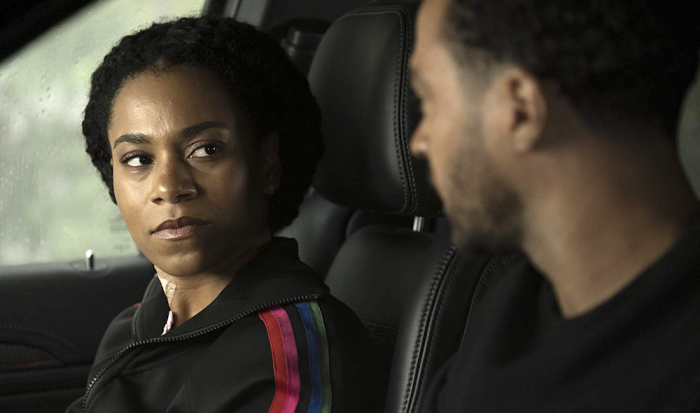“That is how I learned that if I didn’t define myself for myself, I would be crunched into other people’s fantasies for me and eaten alive.” ~ Audre Lorde, 1982
~
Liminality refers to something or someone that straddles the boundary between two things, a middle ground between polar opposites, where a whole new space exists—and/both simultaneously.
Being mixed race or dual heritage is most definitely a form of liminality. I am liminal.
There is no one definitive meaning of liminality amongst mixed race people, as each and every individual has their own story, background, and nuances that have shaped their experience.
One thing that does universally exasperate and bore liminals to death are the questions, “Where are you from?” or, worse still, “What are you?”
As if our complex identities can somehow be neatly defined and packaged into bite-sized nuggets to suit the questioner’s unconscious need for ethnic hierarchies that make them feel safe. All you need to do is look around you to see rigid binaries and labels starting to shift, melt, and flow into one another, creating a new third culture.
As a woman of mixed heritage, I’m still intrigued by the process that unfolds in this liminal space. It feels like one of fluidity, freedom, and possibility—a borderland where all versions of myself are free and all potentialities possible. Somehow foreign and familiar.
As a daughter of a German father and Egyptian mother, both of whom were migrants to Australia in the 70s, for very different reasons—my mother invited by a wealthy Egyptian to work in his pharmaceutical factory, building his empire, my father a solo traveller and free spirit escaping post-war Germany for a better life—I do know what it feels like to have a sense of living in two, even three, different worlds and cultures simultaneously. By default, from my parents’ choices, myself and my brother instantly became third culture kids—children who belong to neither of the countries on their parents’ passports.
Having this German surname, looking Mediterranean, and definitely possessing an Aussie twang and sense of humour is something I enjoy now and play around with.
Being a bit of this and that allows me to fit in anywhere and everywhere. Foreign and familiar. I get to play with different languages, cultures, and groups that my white friends just aren’t able to do so seamlessly. The joys of liminality.
Though the deep insecurity while growing up was that I was never enough—not white/Aussie enough, not important, authentic, or even whole enough—it struck me that part of my experience as a mixed race person is exactly that: not ever being enough of any one thing. The experience of being somewhere in the middle, neither here nor there, ambiguous, reinforces the question of “being enough” and does feel like a part of my mixed identity, permanently on the peripherals.
Though, to be fair, in Australia and in the United Kingdom, as I’m slowly learning, you can’t be half white (the racial construct just doesn’t actually allow it). It’s either you’re white or you’re not. I now know that this was the feeling I had as a child, but clearly didn’t have the vocabulary to express it. I’d been excluded for being indefinable, unable to be compartmentalized, and therefore too foreign to be understood.
Growing up in 80s Australia, I was one of only three mixed race kids at my Catholic school, which was tough. Plus, my mother was separated from my father. This added another layer to the pain: shame.
All the popular girls had blonde hair and blue eyes, played netball or had ballet lessons after school, ate Vegemite and cheese, while I ate okra and peas, alone with my fuzzy ‘fro while reading my books. Tough gig for a “foreign” kid.
I never tried to integrate, as I was painfully shy and well aware of my inherent differences. Even my “tribe”—the three kids with Arabic-speaking parents—treated me different in some ways. My third-grade teacher referred to me as a mongrel, which I naively took as a compliment. It wasn’t until years later when my father, a huge animal lover, referred to the neighbour’s new cross-breed dog by the same term that I got it. I was absolutely devastated.
The confusion with my identity went on unaddressed for years. Not having anyone to even start a dialogue with was so deeply repressive. I constantly felt like I had to choose once and for all what/who I was most—Egyptian, German, or Australian. As if choosing Egyptian would or ever could erase the German heritage, or vice versa. Was it blood, nationality, or neither that properly made up the complexities of a person’s identity?
Then came the death of my mother as a child. So, essentially, I was raised by my many Lebanese school friends and their amazing archetypal Arabic mothers, which I realise now caused me to actually abandon the whole mixed race narrative to become an adopted “Lebo” for some safety, security, and a sense of belonging within a tribe and ultimately within myself. Foreign and familiar to myself.
Though as the years passed, I saw how with each label I gave myself for “definition,” I was only serving to restrict, confine, and limit myself more and more. So I left Australia to travel around Europe, seeking something greater and far more expansive than what I knew.
Over a decade ago, I chose to live and settle in London, a place that relates to neither of my parents’ heritage, purely because London felt like I had finally come home, the second skin I was seeking. Where I could be anonymous and uniquely identified within a tribe simultaneously.
Yes, the cliché of London being a melting pot of cultures is certainly true, but for people like myself who are a melting pot of cultures within their own bodies and minds, this is not just a desire—it’s an absolute necessity. While I can’t speak for all mixed race folk, huge, sprawling multicultural cities are the best place to lose and find oneself. My soul found peace in London. I was familiar and foreign simultaneously, and it was okay.
It was in London where I found and got serious about yoga, while working in a high-pressure advertising sales job in the city. Those Monday-night yoga classes gave me the much-needed clarity, peace, and strength to navigate my life off the mat.
Unwittingly, it also allowed me to find deep peace in my body where all memories are stored, where all those seemingly discombobulated, fragmented, and broken pieces of myself were finally allowed to just be, until eventually an expansive state of wholeness would be viscerally felt within me. Just my mat and I—free from the male gaze, the white gaze, the labelling and pigeonholing, and all the pain that existed out in the “real” world where I just didn’t belong.
Looking back at Australia from so far away indeed gave me some much-needed perspective and understanding of the seemingly black/white world I had just left behind. Perceiving it through the eyes of several mixed-race, European, and BAME (Black, Asian, and Minority Ethnic) friends allowed me to see it fresh and finally take a long, deep breath into the realization that I wasn’t alone in my perception that Australia had a long history of racism. A racism so apparent and deep-rooted that it exists in all people’s psychological landscape.
In 2019, somehow, now us liminals are trendy, being used to advertise everything from food to fashion and finally allowed to be visible and have a voice. I guess there are a lot more of us existing, thankfully, so this allows us to honestly and openly share what it means to be mixed, on the borderlands of self and other simultaneously.
We are in the unique role now of being able to be educators on the world stage with regard to conversations on race, identity, and the hotly debated topics of immigration and asylum.
There are a few progressives claiming that we have now properly moved into a post-racial society—with liminals’ existence as proof. But in my opinion, in the era of Brexit/Trump/far-right nationalism, we are a million miles away from that reality. If anything, that would just be another brutal form of blindness that would delude us for another generation.
Three ways to support mixed race people:
1. Accept how an individual self-identifies.
As simple as it sounds, please do take our own word for it. After all, we have been living in these confused mixed bodies for all of our lives. Stop telling us how we should feel or be or do! Just because you know another mixed race person, there is no universal mixed race definition. Listen and accept how one person views themselves. Like with my own brother, siblings can completely relate to themselves, family, and the outside world differently. Do your best to shut up and listen.
2. Know that we are all unique.
No two mixed people are the same. I know several Jamaican-Irish people here in London, as well as my own mix of Egyptian-Germans now, and I can safely say we’re all dramatically different and unique. Which is something to be embraced and celebrated, not to be ashamed of.
3. Get educated. Read, research, and of course, learn on your own.
Be inquisitive on the dialogue as well as generalisations, micro-aggressions, and labels that come about around mixed race people. Don’t assume you know; feel free to ask and admit you don’t know what to say or how to view a liminal. The best thing about the rise of multiracial people and populations is that we are raising awareness and may help the rest of the world develop the flexibility to see people as more than just a demographic—and to move away from race as a key component of one’s identity. Identity is a deep, complex, and highly personable topic. Always ask questions!
Finally, I really can’t say I know what the long-term solution is to the problem of foreigners not being allowed to become familiar. But I can say from a mixed race perspective that what was once familiar is fast feeling foreign, and what’s foreign may soon have to become familiar across all aspects of our societies and all realities.
And above all, what I truly wish everyone would do more of is to try to understand the other, put yourself in their shoes to truly try to see yourselves through the eyes of the other.
If that’s unattainable, then perhaps try asking yourself this: How can I make others who are unfamiliar, foreign, and different become familiar and comfortable?
In my mind, the answer is simple: the same way you do with any of your current friends. You simply start a conversation and find some common ground.
Who knows? You may just find that those “foreigners” are way more relatable and familiar than anyone currently in your world right now.


 Share on bsky
Share on bsky





Read 5 comments and reply